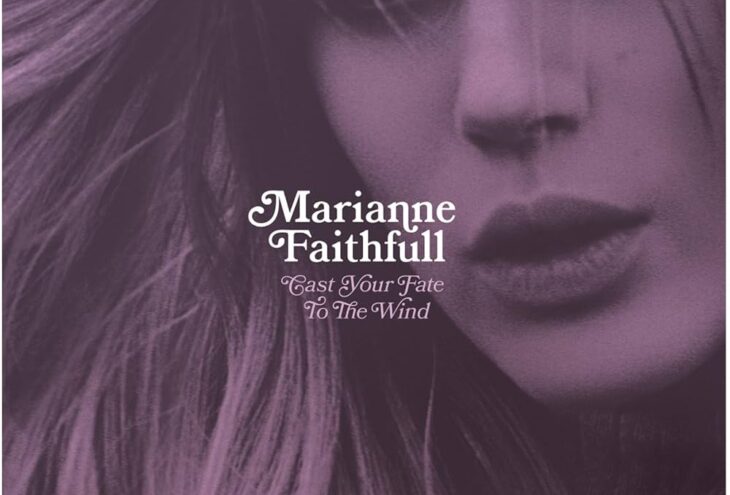Singer, actress, author and performer Marianne Faithfull’s complete UK Decca catalog has been reissued on LP, CD and streaming.
Before her passing on January 30 this year, Marianne completed work on two projects that were to commemorate her 60th anniversary in music; the first was her final EP Burning Moonlight, a collection of four songs inspired by her Decca recordings, the second was her contribution to this series of reissues where she talked in-depth about her Decca recording career for the first time.
All four of Marianne’s original Decca albums Marianne Faithfull, Come My Way, North Country Maid and Loveinamist have been reissued on vinyl alongside Cast Your Fate To The Wind: a new double LP of the collected singles, B-sides and rarities. Simultaneously a 6 CD boxset will be released called Cast Your Fate To The Wind: The Complete UK Decca Recordings,which features all the albums reproduced on miniature facsimile LPs, a new double album of the singles, B-sides and rarities, five art cards and a 76-page book featuring many rare and unpublished photographs.
Three of the original albums are appearing on vinyl for the first time since they were released, and the artwork on all four original LPs has been recreated where possible from the original images giving a high-quality finish to this set of reissues.
The music has been remastered from the original tapes by Grammy nominated producer Andrew Batt who was the Executive Producer of Burning Moonlight. He also contributes a full-scale reassessment of the Decca recordings in his in-depth sleeve notes included in each LP and the CD boxset. In these, Marianne comments on the source of the songs and her role in the recordings, conclusively debunking the received wisdom that in this phase of her career she was little more than a record label puppet.
In 1964, Marianne Faithfull was spotted by the impresario Andrew Loog Oldham, and her recording career began in June 1964 with the release of her debut single “As Tears Go By.”
“As Tears Go By” is a song penned by Mick Jagger, Keith Richards and Andrew Loog Oldham. It reached a top ten position in the UK singles chart. The Stones then recorded their own version, included on the American pressing of December’s Children (And Everybody’s) in 1965. Their American record label London issued “As Tears Go By” as a single that landed in the number six spot on the Billboard Hot 100 singles chart. The Rolling Stones subsequently performed the tune on an episode of The Ed Sullivan Show.
In 2000 I discussed Faithfull with Andrew Loog Oldham, the 1963-1967 record producer and manager of the Rolling Stones, for Discoveries magazine.
“The fact is forgotten that Marianne had, between August of ‘64 and the summer of ‘65 four Top Ten hits in the UK. ‘As Tears Go By’ and ‘Come and Stay With Me’ held up.
“For one it was obvious that ‘this thing of ours’ was not going to disappear. We had come in following the Twist, Davy Crockett, Skiffle, and Trad Jazz. Skiffle and Trad Jazz had been very important; they had been the BBC and the Establishments last chance to control the key to what music we got to hear. You had during 1957-1958 like The Six-Five Special; hosted by Pete Murray (God bless him!) and Jo Douglas which invited us all to deck up in jeans and sweaters and be really daring with our shirt collars turned up.
“There were villains, there was mayhem, action and if we had not had Pirate radio I might not have had a hit with Marianne Faithfull's ‘As Tears Go By.’ The BBC would not touch it, they said Marianne could not sing. Mind you, that's what they'd said about Mick Jagger a year earlier when the Rolling Stones failed their BBC live audition. They said ‘The singer cannot sing.’ The BBC was the enemy, a limp wristed arm of the government trying to keep kids on a rationed musical diet of trad jazz and skiffle.”
A news announcement from ABKCO provides an overview of Faithfull’s Decca releases.
“Its melancholy reflection would set the tone for many of her subsequent recordings and in the wake of the singles success, Decca wanted to consolidate her position with a pop LP. However, in an early show of artistic strength Marianne resolved to record an album based on the folk songs she had been performing in local clubs before she was signed. Decca agreed, on the proviso she delivered the pop album too, and so it came to be that Marianne had two debut albums released on the same day in April 1965: an unprecedented move for a largely untested artist.
"Marianne’s folk debut Come My Way contains some standout recordings, including the title track written with guitarist/producer/arranger Jon Mark who would become one of the most important figures in Marianne’s early career. He not only played on all Marianne’s Decca albums, but also accompanied her onstage and at TV appearances.
“Other highlights include her interpretation of the traditional songs “Once I Had A Sweetheart” and “Fare Thee Well,” the latter more than a match for Joan Baez’s original recording. The album was a personal collection in more ways than one, as songs like her spoken word recitation of Lewis Carroll’s “Jabberwock” and “Full Fathom Five” from Shakespeare’s The Tempest came out of her work with the Prospect Theatre, a local theatrical group that she performed with before her recording career.
“Marianne’s eponymous pop LP was produced by Mike Leander, one of the key musical forces behind the ‘60s pop scene, and along with Jon Mark, the key person behind Marianne’s early work. He was instrumental in creating her signature folk-pop style and would go on to produce almost all of her Decca recordings. The album was roughly divided between cover versions and songs written specifically for her including another of her biggest ‘60s hits, “Come And Stay With Me” by Jackie DeShannon. Featuring Jimmy Page, the song remained a personal favorite from the period; aside from her debut single, it was the only one of Marianne’s early hits that she performed on subsequent tours. Although pop in sound, several of the standout tracks on the album were actually selected by Marianne from her collection of folk records including “What Have They Done To The Rain?” and “Plaisir d’amour,” which became a favorite encore.














